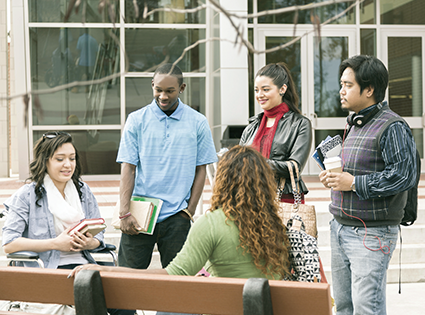Racial segregation in college?
Is the Supreme Court in favor of “apartheid” in U.S. universities? This Court has dealt two hard blows to the most disadvantaged minorities. It has ended “race-based affirmative action” for college entrance, and blocked student debt forgiveness. Both measures hurt 26 million students. But especially Latinos, the largest college minority for more than two decades. Congresswoman Alexandria Ocasio-Cortez and prominent UAA members weigh in on Sol de Medianoche.Is the Supreme Court wanting to impose university “apartheid” in the United States? On two successive dates, last June 29 and 30, the court, composed of six conservative and three liberal justices, has dealt two fatal blows to the socially and economically disadvantaged. Two decisions that severely hurt Latinos, the largest minority on U.S. campuses for more than two decades and the fastest-growing college population in the last 23 years.
On June 29, the Supreme Court (or SCOTUS, for Supreme Court of The United States) ended “affirmative action” on college campuses, finding that Harvard and the University of North Carolina “violated the Constitution by using race as a factor in the admissions process.” “Many universities have concluded, erroneously, that the cornerstone of an individual’s identity is not challenges overcome, skills built, or lessons learned, but the color of their skin. Our constitutional history does not tolerate that decision,” wrote Chief Justice John Roberts. Just this June 29, the Supreme Court adopted three other decisions, which “have slowed, but not reversed, the steady erosion of voting rights over the past decade, especially for voters of color in Southern states,” Ethnic Media Services (EMS) reports. On June 30, the Supreme Court struck another blow to minorities. It blocked President Biden’s student loan debt forgiveness plan, invalidating a program that would deliver up to $20,000 in relief to millions of indebted students who can barely thrive or make ends meet. There have been 26 million petitioners and the federal government has already approved aid for 16 million of them, pending review of 100% of the applications, according to official White House sources. “If the SCOTUS was serious about its ridiculous claims, they would have abolished legacy admissions, also known as affirmative action for the privileged. 70% of Harvard’s legacy applicants are white. SCOTUS didn’t touch that, which would have impacted them and their sponsors,” opines Democratic Congresswoman Alexandria Ocasio-Cortez (AOC) for Sol de Medianoche. On blocking debt forgiveness, AOC tells us, “Judge Alito accepted tens of thousands of dollars in lavish vacation gifts from a billionaire who lobbied to overturn student loan forgiveness. After the gifts, Alito voted in favor of the override. This corruption of the SCOTUS undermines its own legitimacy by putting its rulings up for sale.” “It is very important to note that this Supreme Court ruling does not eliminate Biden’s ability to pursue student loan forgiveness,” Congresswoman AOC adds to Sol de Medianoche. “The Biden Administration can use the HEA (Higher Education Act), which has been my position from the beginning, to pursue loan forgiveness before payments resume. They should do that as soon as possible.” The three progressive minority justices opposed to the measures are Elena Kagan, who accused the Court of substituting itself “once again for Congress and the Executive Branch, and the hundreds of millions of people they represent, in making this nation’s most important and controversial policy decisions,” Sonia Sotomayor, and Ketanji Brown Jackson. Kagan also fears that this SCOTUS criteria will again be applied against flagship government programs, such as Medicare. “Who knows next year, the secretary of Health and Human Services may find himself unable to implement the Medicare program under a broad delegation because of the (huge) ‘economic impact’ of his actions.” Jonathon Taylor, director of Public Affairs for the University of Alaska System, told Sol de Medianoche that “we are reviewing the Court’s decision and its impact on our admissions and programs. But we do not anticipate significant impacts on our processes. The University of Alaska, guided by the Board of Regents, is committed to enhancing the diversity of our entire system so that all of our students, faculty and staff feel welcome and supported, and to foster an open, inclusive and vibrant educational experience throughout the system.” “The more integrated we are — the more diversity we have in all of our programs — the stronger we will be,” concludes Jonathon Taylor. Shanone Tejda, president of the Union of Students of the University of Alaska Anchorage (USUAA) doesn’t seem so sure: “Given that the University of Alaska is an open access institution, I’m not sure of the ramifications of this Supreme Court decision. We are working to get a sense of what the repercussions may be here, at UAA and across the UA system.” “Affirmative action ensures that education systems are aware of who their students are and how they identify. I believe that educational institutions should strive to be inclusive. Justice Ketanji Brown Jackson makes this point in her dissenting opinion when she states that deeming race irrelevant in law does not make it irrelevant in life. Our society is only continuing to take steps to correct race-related imbalances, whether in the workforce, in neighborhoods, or in educational institutions. There is much work to be done,” Shanone concludes. As it happens, conservative SCOTUS Justice Clarence Thomas benefited from affirmative action as an opportunity now denied to millions of students. Thomas was among the first generation of black Americans to come of age in the era of affirmative action. Thanks to affirmative action, he entered the College of the Holy Cross in Worcester, Massachusetts, in 1968. And in 1971, he was admitted to Yale Law School, which wanted 10% of its incoming class that year to be students of color. Finally, this Supreme Court ruling striking down race-conscious college admissions could have a radical impact on nonprofits and philanthropy. It will create hurdles for foundations and charities working to promote diversity in grantmaking and hiring decisions. |
